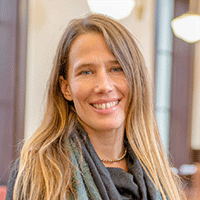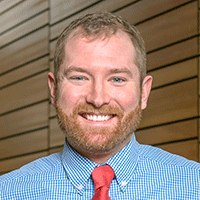Gillings School students claim 7 of Graduate School’s 22 Impact and Horizon awards
April 4, 2018
The UNC Graduate School has announced that seven of the 22 Impact and Horizon awardees for 2018 are students at the UNC Gillings School of Global Public Health. The awards acknowledge student research that benefits the people of North Carolina.
Gillings School honorees include Julia Considine (Public Health Leadership Program), Thibaut Davy-Mendez (Epidemiology), David Gorelick and Sarah Rhodes (Environmental Sciences and Engineering), Cassandra Johnson and Shan McDonell (Nutrition) and Sarah Kowitt (Health Behavior).
McDonell received one of five Horizon Awards, and others received six of the 17 Impact Awards.
Julia Considine, author of “Supporting N.C. Schools with Implementation of Healthful Living Essential Standards,” collaborated with the N.C. Department of Public Instruction (NCDPI) to determine how NCDPI’s Healthful Living Essential Standards are taught, who teaches them, what resources are used and what additional support is needed. Her interviews with administrators and educators found that 88 percent of health and/or physical education teachers interviewed did not receive sexuality education courses for their degree and that the strongest source of support for health education in schools is the presence of a healthful living coordinator or student health coordinator.
Based on her research and at NCDPI’s request, she is developing foundational content in the form of online modules about the Healthy Youth Act (including LGBTQ inclusivity), sexually transmitted diseases and healthy relationships that will support in-person training.
“As an outcome of Julia’s findings,” said her adviser Lori Evarts, MPH, assistant professor in the Public Health Leadership Program, “actions are underway to foster greater and equitable access to this vital health education across North Carolina.”
Thibaut Davy-Méndez, whose work involved “Applying a New Approach to Estimate HIV Drug Resistance in N.C. Patients,” found that during the past decade, the prevalence of resistance to three older HIV drug classes has decreased at the UNC Center for AIDS Research, but remains significant (between 15 percent and 30 percent), while resistance to the latest class of drugs has remained low, at about 2 percent.
His results suggest that while resistance is still a significant issue for some patients, it may be less a concern today than a decade ago within UNC’s HIV clinical population.
“Thibaut’s work on HIV drug resistance is essential to informing clinical care management and public health guidelines,” said Sonia Napravnik, PhD, assistant professor of epidemiology at the Gillings School and Davy-Méndez’s adviser.
David Gorelick’s project, “Maintaining Water Supply Reliability Through Raw Water Transfers,” demonstrated that raw, or untreated, water transfers between Raleigh and Durham (N.C.) could help to maintain regional supply reliability during droughts without the need for costly infrastructure or use restrictions.
Gorelick also found that Durham could maintain satisfactory levels of supply reliability despite occasional releases of water to Raleigh. The work is part of an ongoing research collaboration funded by the National Science Foundation and involving UNC-Chapel Hill and Cornell University.
“David’s hard work and ingenuity are leading to more cost-effective and sustainable strategies for the Triangle and many other regions experiencing water scarcity,” said David’s adviser, Gregory Characklis, PhD. Characklis is Philip C. Singer Distinguished Professor of environmental sciences and engineering and director of the UNC Center on Financial Risk in Environmental Systems.
Cassandra Johnson’s research “has addressed the longstanding need to improve the current, and now outdates, measures of food insecurity,” said Johnson’s adviser, Alice Ammerman, DrPH, Mildred Kaufman Distinguished Professor of nutrition.
The U.S. Department of Agriculture categorizes food insecurity by focusing on reductions in food intake. However, people who experience food insecurity report many undesirable experiences related to not having enough food – including food shortages, prioritizing food quantity over quality, and feeling stressed and isolated. Johnson developed the Four-Dimensional Food Insecurity Scale (4D-FIS) to capture those additional aspects.
By using the 4D-FIS and working with low-income families in North Carolina, Johnson provided valuable knowledge to community organizations and local government and helped more people access the food they need to be healthy and active.
Sarah Kowitt, author of “Making Key Connections Across Three Waves of a Youth Tobacco Survey,” analyzed survey data between 2011 and 2015 to provide insights central to tobacco education and prevention efforts. She led what was likely the first study examining e-cigarette use among youth not susceptible to smoking cigarettes and was co-author on research documenting the growing prevalence of e-cigarette use (from 1.7 percent in 2011 to 6.1 percent in 2013) within this population. Her research determined that students who used both e-cigarettes and cigarettes were less likely to intend to quit cigarette smoking.
“Without Ms. Kowitt, our research team and state would lack critical knowledge to advocate for resources to prevent future generations of youth from using tobacco,” said her adviser, Adam Goldstein, MD, MPH, professor of family medicine and director of tobacco intervention programs in the UNC School of Medicine.
Shan McDonell, through his project “Decreasing Breast Cancer Metastasis by Treating Inflammation,” developed a mechanism to test an anti-inflammatory compound’s effectiveness in reducing obesity-related increases in metastases from breast cancer. His team found that mice on a high-fat diet supplemented by an anti-inflammatory drug had tumor sizes no different than mice on a low-fat diet. The anti-inflammatory drug also reduced the higher burden of lung metastases seen in obese mice.
“If Shan’s targeted strategy, using safe, inexpensive drugs such as aspirin, reduces obesity-associated breast cancer deaths by 25 percent (a conservative estimate, based on his preliminary data), that could save the lives of 500 women in North Carolina every year,” said McDonell’s adviser Stephen Hursting, PhD, professor of nutrition at the Gillings School.
Sarah Rhodes won an Impact Award for her project, “Implications of Antibiotic Use Within Industrial Hog Operations.” North Carolina is the largest producer of hogs for meat consumption in the United States. Industrial hog operations routinely administer antibiotics to hogs to prevent and treat disease and maximize growth, which has contributed to the emergence of antibiotic-resistant bacteria in livestock and concern that the resistance could be passed to humans.
Rhodes compared the prevalence of antibiotic-resistant bacteria in swine, air and the breathing zone of researchers performing animal-handling activities at one industrial operation and three pasture-based antibiotic-free operations. She found that industrial hog workers may be exposed to S. aureus, an antibiotic-resistant, livestock-associated bacterium. She is working to inform agencies in North Carolina about the implications of antibiotic use in hog production.
“Sarah is answering questions of global importance, all while studying local sites and in direct consideration of people affected by disproportionate environmental and health impacts,” said Rhodes’ adviser Jill Stewart, PhD, associate professor of environmental sciences and engineering at the Gillings School.
The longstanding Impact Award, made possible through the generous support of the Graduate Education Advancement Board, recognizes discoveries with a direct impact on North Carolina in the present. The Horizon Award, first presented in 2017, recognizes discoveries with potential to benefit North Carolina and beyond. Master’s and doctoral students, working in close collaboration with faculty mentors, are eligible for the awards, which honor their commitment to improving human health, strengthening communities and/or helping to develop greater understanding of the world’s biggest challenges.
Friends, family members and colleagues of the awardees are invited to attend the annual Graduate Student Recognition Celebration, hosted by The Graduate School, on Thursday, April 5, from 4 to 5:30 p.m. in the George Walls Hill Alumni Center’s Alumni Hall. A 4 p.m. awards ceremony will precede research poster presentations and a reception with heavy hors d’oeuvres.
Parts of this article originally were published earlier this month on the UNC Graduate School website.
Gillings School of Global Public Health contact: David Pesci, director of communications, (919) 962-2600 or dpesci@unc.edu







